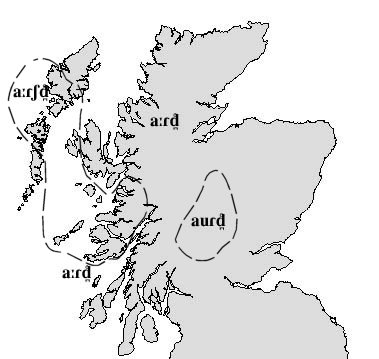An diofar eadar na mùthaidhean a rinneadh air "aːRd vs aːRʃd or Where the sh comes from"
| Loidhne 5: | Loidhne 5: | ||
* It affects rt and rd groups in Gaelic. | * It affects rt and rd groups in Gaelic. | ||
| − | * Traditionally, not all dialects are affected as you can see on the map | + | * Traditionally, not all dialects are affected, as you can see on the map, and Perthshire Gaelic even diphthongises the [a]. Due to the pervasiveness of Lewis Gaelic in the media, teaching, and so on, this feature has spread into other dialects. So, the presence or lack of [ʃ] is no longer a clear cue to geographical origin. |
[[Faidhle:ard.JPG]] | [[Faidhle:ard.JPG]] | ||
Am mùthadh mu dheireadh on 22:28, 28 dhen t-Sultain 2013
We won't go into the discussion of whether this feature is Norse or Martian because unless you are hoping to become a historical linguist, it doesn't matter.
So what can we tell you about this strange [ʃ] that pops up in Gaelic?
- It affects rt and rd groups in Gaelic.
- Traditionally, not all dialects are affected, as you can see on the map, and Perthshire Gaelic even diphthongises the [a]. Due to the pervasiveness of Lewis Gaelic in the media, teaching, and so on, this feature has spread into other dialects. So, the presence or lack of [ʃ] is no longer a clear cue to geographical origin.
- If it occurs, it tends to occur only in stressed syllables so ainneart for example tends not to have this intrusive [ʃ].
- Some speakers tend to insert [ʃ] only in rt groups, but not rd groups, but never the other way round. Thus, you'll hear speakers who pronounce ceart and àrd as [kʲaɹʃt̪] and [aːɹʃt̪] but never [kʲaɹt̪] and [aːɹʃt̪].
Beyond that, there doesn't appear to be a clear rule, but we'll research this further and see whether there actually is a rule.
For learners, it seems to be a good guideline to insert [ʃ] both in rt and rd groups in stressed syllables, that's to say first syllables. That won't sound wrong to a Gael's ears even if he does not pronounce the intrusive [ʃ]. Unless you're desperate to learn a particular dialect, which we don't recommend, you'll have to memorise your chosen dialect's rt and rd words. As far as we can see, the option to use [ʃ], or not, does not appear to be rule based.
To listen to some examples, check our Fuaimean na Gàidhlig section.
| Beagan gràmair | ||||||||||||
| ᚛ Pronunciation - Phonetics - Phonology - Morphology - Tense - Syntax - Corpus - Registers - Dialects - History - Terms and abbreviations ᚜ | ||||||||||||
